Ethan Renoe's Blog, page 5
September 12, 2024
I can’t pin down life.

In 2018 I wrote that “Life is a collection of feeling woozy in various places.” In 2023, I found out I was just iron deficient.
Despite the medical diagnosis and the (fortunately) very simple solution of taking one iron pill a day, it was a poetic attempt to sum up the entirety of this world, this life, this goodness and this beauty. And I mean all of it…all of the beauty and vibrance all around you which most of us don’t even notice.
We walk right by it, numbed to the wonder like a security guard at the Louvre.
I’m still trying to find one sentence — or maybe a paragraph — that sums up life, and perhaps there is not one. In fact, I’m pretty sure there’s not. And that’s why we’ve never managed to exhaust the endless combinations of words and sentences and stories and descriptions. How many adjectives can we pair up with all the nouns that exist? And then to make them verb.
Sometimes I get angry at my own inability to sum up reality in words.
In my 8th book, I wrote that ‘language hovers above reality like a cloud above the earth.’ It doesn’t participate, it merely hovers nearby.
And the more I write, especially on days I get frustrated with the smallness of words, I find that to be true.
Even the big words are small.
Even on my iron pills I occasionally feel woozy.
Something about the orb we’re all stuck to soaring through the vast nothingness at a billion miles per hour.
And that’s another thing. They say the earth soars through space at like 7,000 miles per hour, but, compared to what? When you zoom out enough, those sorts of measurements would lose meaning. Because, we may be going that fast around our sun, but how fast is our galaxy soaring around other galaxies? Is there a center of the universe around which it all orbits? And how fast are we whipping around that?
When attempting to sum up the totality of life, do we start with the micro or the macro? The subjective or taking a stab at the objective? And if the latter, where would you begin?
That’s really what I attempted to do in that book, but that’s also why it’s called part 1: because there are infinite parts, are there not?
If you’ve successfully summed up life in a sentence, let me know.
Until then, I’ll keep traveling and experiencing and waking up and soaking it all in while I’m here, before I become larger…Because there’s no way you die and then become smaller.
e
Day 52 of 100 Days of Blog
Click here to subscribe to my newsletter!
The post I can’t pin down life. appeared first on ethan renoe.
September 11, 2024
The Pessimism of Secularism
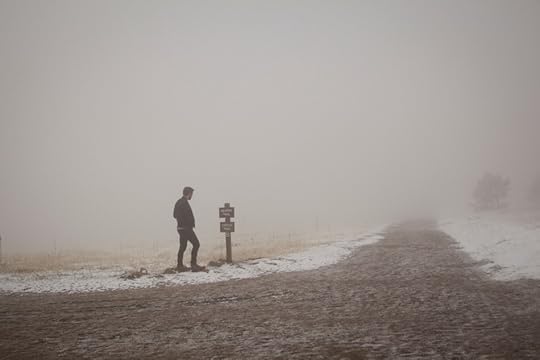
I just finished reading a blog post written by a 72 year old about things she wishes her younger self could have known. I won’t link it because I’m not trying to shame anyone or start beef, but here are some of her main points, copy and pasted, not modified at all:
There is no god.People lie all the time.Most of humanity is not very bright.There is no meaning to life.Even family and friends can take too much from you.Everybody is not equal. Everybody is not the same. Everybody is not well-intentioned or good. Some are downright evil.These are not all of them, but my selection of about half. Some were practical (albeit still negative), such as “People who gossip about others with you will gossip about you to others.” But as you can see, the vast majority are negative, hopeless, and pessimistic.
Now, I don’t mean to lump together all atheists as if they’re all nihilistic Eeyores, but all the comments on this post are a resounding “Amen! Yes! I wish I had known these too!” I flicked through them, wondering if anyone else was exhausted by the draining hopelessness of the post, but every last one applauded her straight-up truth telling style.
If she was my grandma, I think I’d be dead in a gutter somewhere.
Besides the fallacy-riddled reasoning (no god or meaning…but people can be evil… maybe the not-bright humanity was self-referential?), it made me wonder why this would be touted or celebrated as a triumphal late-in-life realization.
Why applaud the void?
What beauty or substance is there in telling younger generations that everything is meaningless and nothing matters (but there are still evil people); I mean, what will you accomplish?
Compare this to the teaching of someone like Jordan Peterson. Without calling upon a higher power, he is able to come up with a reason to charge forward in life, to rise up, to better yourself, to make your bed and put your room in order. And if we as a society can take care of our own respective corners of the world, how much better would our nation be? If we each adopted a positive (and I mean in the philosophical sense…as in based on something or a substance, rather than the grandma’s apophatic philosophy of life; arguing from the negative, or from absence) mindset, what could we accomplish?
This grandma is the exact type of person who would hate JBP, I can tell. And she would hate him because rather than preaching nihilism and despair like her, he is calling people to rise up and at least find a meaning for their lives; to stand for something rather than nothing; telling them that there can be a hope for a better tomorrow, if you would only pull yourself up and aim at it.
To me, the choice of which perspective is superior is obvious, and not just because I’m a Christian.
Would I cheer for the light or the shadow to win in a fight?
Would I prefer the water in a glass or the empty part?
Would I prefer something or nothing?
Philosophers tend to agree that existence is better than nonexistence; something is better than nothing, in a qualitative sense. If you have nothing — which we cannot imagine — then you can’t start anything or go anywhere or get a foothold or go anywhere. Deconstruction without reconstruction is fruitless.
The problem with the woman’s perspective (aside from the logical fallacies, insulting language, and general despair) is that it’s based on nothing. If she’s right, then she has accomplished nothing. Because, by her own standard, if it’s all meaningless, there is nothing to accomplish. Progress is meaningless and so is being right.
Apophatic philosophy (only describing things in the negative, or by what they’re not) doesn’t lead to invention or hope or progress or bettering the world for the oppressed. Only a philosophy that says, Yes, there is good in the world despite all the bad, and there are things we can aim at that would make it better for us all, and there is an objective evil because there must be an objective good! has any hope at making the world better, or giving meaning to our lives.
Dismal posts like that bug me because on the surface they can sound right. Cynics have a way of persuading us that they’re correct, because they’re negative…they don’t need to prove it.
But fighting for substance and hope and The Good, as well as God? That takes effort and patience and again…hope.
Christians (and everyone) need hope, even when the little cynic in all of us begins to creep up.
I can’t help but wonder if the author of that post, deep down, hopes she’s wrong. If perhaps, at the floor of her being, she too longs for hope.
e
Day 51 of 100 Days of Blog
Subscribe to my newsletter here!
The post The Pessimism of Secularism appeared first on ethan renoe.
September 10, 2024
The lost art of art in theology

“If you ask 10 students at Denver Seminary who their favorite prof is, 11 would say Tafilowski,” a fellow student told me.
We had been in Tafilowski’s Systematic Theology class, having our minds blown in one of those courses you hear about from students who have come to love school, often thanks to one or two rare teachers. It was my fourth systematic theology course, and fortunately, my second time really loving it and having my mind blown (The first was in undergrad with Dr. John Clark).
One thing Dr. Tafilowski did in many of his classes was sprinkle in artworks which told their own sort of visual story, or communicated something that words alone could not. For example, he put up a picture of Michaelangelo’s David statue and pointed out that the head and the hands were huge and the weiner was tiny.
“This isn’t an accident,” he said. “Renaissance anthropology wanted to emphasize that man is a thinking/reasoning, and working creature, and is not governed by his passions. Thus the smaller genitals and the giant hands and head. They didn’t all just have tiny members back then.”
(He was also the funniest professor I’ve ever had by a mile, which helped)
In a different class, he put up this photo of the Pantocrator and asked us what we observed.

I had seen the painting before, but never gave a whole lot of thought to the intentionality behind some of the decisions made. For example, Christ’s face seems to be divided in half: One half is angelic and clean, the other is haggard, weary, worn. One eye looks slightly up while the other is aimed slightly down. This is because one eye is looking “up” to heaven, where He came from, and one down to earth, for His humanity.
His right hand is making the symbol of the Trinity: two elevated fingers represent the Father and Holy Spirit, while the other two come down and touch the thumb, representing the two natures of the Son: God joins with humanity.
All of this was just from my professor popping the image on the screen and us looking at it long enough to spout off observations. The message quickly sank in: art is not just to make things pretty — especially in Christian historical art — but to communicate something, often in ways words alone cannot.
Not only that, but God is the creator of beauty and creativity et al. So to relegate theology to simply what can be written about in words is a silly concept. Why not expand it to art, photography, dance, theater, et cetera? I mean, how many of us have been moved by the theological imagination present in Tolkien’s Lord of the Rings? (Amazon additions excluded)
I mean look at the rebellious Caravaggio, or Michelangelo and Da Vinci’s masterpieces for the church. The theology and storytelling packed into these works is astounding, and perhaps something we’ve lost with our sleek, clean western, ultra-modern church buildings.
If you have an interest in theology, I encourage you to dive into some church art throughout the years. Even the architecture of ancient cathedrals served theologically significant purposes: Many are laid out in the shape of a cross not only to point to Christ, but to create a central point where all parts of the building seem to converge, and at this point is where there is often a crucifix, and there the Eucharist is served.
If you think theology is just about reading big words in boring books, dig deeper in and find a whole world of fascinating art that has been created to communicate these ideas!
e
Day 50 of 100 Days of Blog
The post The lost art of art in theology appeared first on ethan renoe.
September 7, 2024
how to appreciate things
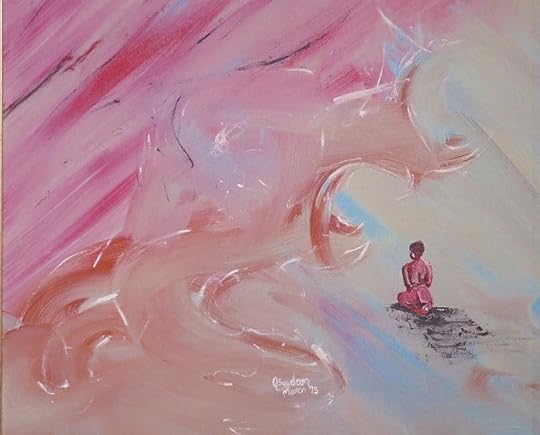
Last night I went to the First Friday art walk in Denver. When I look at art, I glance through the various artists and displays until I find something that really grabs me. Then stand there and bask in it.
I know this sounds almost rude to the artists who poured themselves into their art, but at this event, there are HUNDREDS of artists displaying their art. If you looked deeply at each person’s work, you’d be there many days. But you’d also be numb to the art after the first two or three hours.
I had an art teacher who told us to never spend more than two hours in an art museum. She said that anything you see beyond that will just go right past you and you get desensitized. It’s better to make several trips on different days than try to cram in too much art.
Anyway.
I had wandered around and finally landed on one artist I really liked. The paintings were of abstract fields and shapes and voids, and each had a small solitary figure usually toward the bottom of the piece. Most faced away from the viewer, like they were gazing into the abyss or soaking in the oblivion.
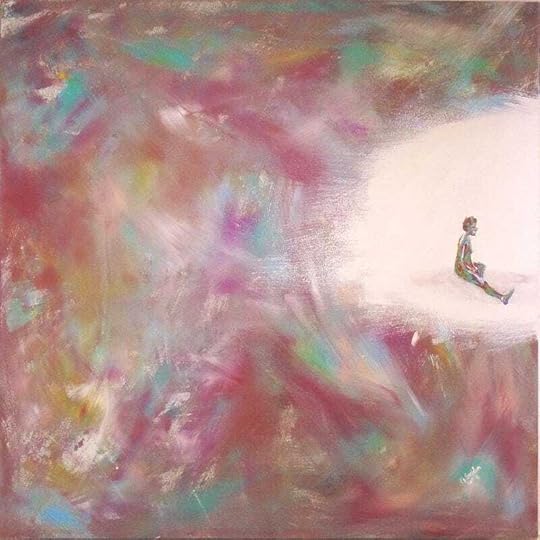 I couldn’t find the one I REALLY liked.
I couldn’t find the one I REALLY liked.I finally could slow down and go piece by piece through this artist’s works.
As I was standing there, a man with two women walked by. He pointed at the piece I was looking at and exclaimed, “Now THAT is just my style!” and quickly walked away.
Now, I recognize that this is exactly how I flew through the first dozens of artists I glazed by. But that was intentional. I was looking for some art to appreciate.
I wondered just why this guy said he loved something so much and then quickly moved on. I don’t doubt that he genuinely loved the painting and style. But I do think we have lost much of our ability to appreciate, well, anything.
Think about how social media has programmed us to see things we love. For me at least, I may find an artist’s Instagram page who piques my interest and so what do I do? I blast through their page as quickly as possible and throw them a few likes and go back to scrolling through countless other profiles hoping to find someone else…who I like as much? It’s a terrible phenomenon.
Literally nothing is good enough to hold our attention anymore.
Nothing is worth appreciating deeply.
Nothing can compete with the dopamine rush of finding what’s next.
If you were (or are) an artist, how would you want your work to be perceived? Would you want someone to walk by in passing and say, “I like that!” and rush away, or would you want to catch the right people who would stay and let it sink into them?
I know I may be making myself seem like I’m better than that dude because I stood there and he didn’t, but it’s because it’s something in myself I’m trying to force. Because most of the time, I approach art and beauty with the same passing modicum of interest. Maybe one way to say it is, most of the time, I am him and seeing his explicit “two second appreciation” was like a mirror for me.
What would change if we were able to look deeply into paintings, nature, people, and even other things like good food or a bike ride, and appreciate them more richly? I think our dopamine-sick brains would settle down and become more satisfied. Instead of seeking what’s next, we could extract a deeper appreciation of what’s in front of us now.
Even worse, I’ve found that I can take the same approach to women, in the age of dating apps. There is little difference between swiping through a dating app and scrolling through interesting posts on Instagram. No matter how great the current infatuation is, there could always be more to see. There could be someone who fits your preferences better. It’s insidious.
All we are doing is robbing ourselves of enjoyment.
Enjoy the person across the table from you now.
Enjoy the painting on the wall in front of you.
Enjoy the view out the window of your drive home.
Enjoy it all because there is no better, richer version of reality somewhere else.
One thing that has helped me, because I have no self control, was to ask a friend to put a screen time passcode on my phone. Now I’m limited to 20 minutes of social media a day, which forces me to not scroll, but to use that time to post daily on Crumb Hill and check messages. Then I’m forced out.
I also cannot download new apps without the passcode, so I’m off the dating apps for now. I don’t think they’re inherently bad, but they are for people rebuilding self control!
So I encourage you: Slow down until you can appreciate things again. It’s a lost art and we are moving away from it more and more with every robot that can generate ‘art’ on a screen.
Art is about appreciation, not data transfer. You don’t look once and ‘get all the data at once.’ Good art works on you over time. So let’s appreciate it together!
e
Day 47 of 100 Days of Blog
Subscribe to my newsletter here!
The post how to appreciate things appeared first on ethan renoe.
September 5, 2024
rules for casting out demons

I was asked a new question.
I had finished recounting the story of a man
who acted like a chicken in Thailand.
“He’s been like that for a month,”
we were told.
“He won’t eat or sleep or drink or speak Thai,”
but he was speaking a language none of us knew.
We prayed for him for two minutes and he shouted,
in Thai,
THEY’RE GONE! THEY’RE GONE!
and he moved his legs and spoke to his wife.
So I told this story to someone and she asked,
“What if the demons came back?
Would they know what to do?”
And I had no idea what the answer was.
So tonight, I pray two more minutes for Jahto,
the man who saw the demons in his hut
and had peace when they were gone.
I pray they never come back,
because I don’t know the rules here.
e
Day 45 of 100 Days of Blog
Subscribe to my newsletter here!
The post rules for casting out demons appeared first on ethan renoe.
September 4, 2024
There is a heaven, but you’re not going there.
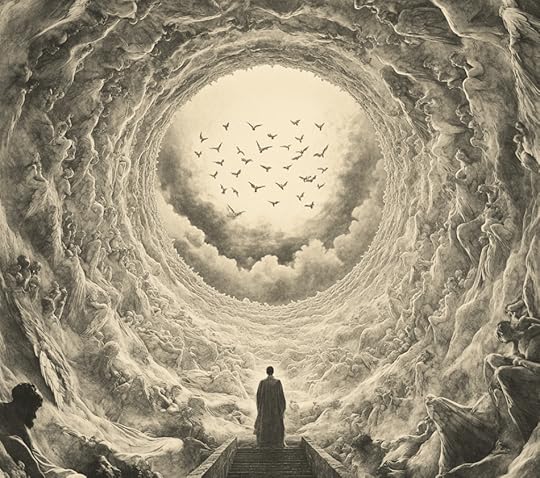
One of my biggest little pet peeves when it comes to people talking about the Bible is saying that we ‘go to heaven.’
It’s simple really. It’s not in the Bible.
There is an obscure verse in Thessalonians about being ‘caught up in the air with Christ,’ but that’s about as close as the Bible gets to saying that we go to heaven. Well, plus the fact that Christ ascended to heaven….literally. He went up into the sky. So I guess one person has gone to heaven.
In Revelation 21, John sees the new heavens and new earth descending, because the first had gone away. But that’s not humans going to heaven…if anything, it’s the opposite — heaven coming to humans.
Isn’t that what we pray in the Lord’s prayer?
‘On earth as it is in heaven.’
Whenever the Bible uses the term, you need to enter into the ancient mindset. They used the term ‘heavens’ to refer to all the stuff up there, which we can see but not touch.
Stars
Clouds
Sun
Moon
Planets
Blimps
jk
Think about it like an ancient person: There is a realm we can see and touch (the earth: land, sea, etc.), and a realm we can see but not touch. And that, to the brilliant ancient imagination, is the heavens.
They often talked about God living up above the dome of the sky, or the Firmament. Thus, we have psalms like 115, which says, “the highest heavens belong to God.” Not just the heavens (the dome with the lights in it), but the highest heavens.
But regardless, when you die, you don’t go there.
We are so used to this binary thinking of “Go to heaven or hell” that we just automatically plug them in when we read other verses. But here’s a challenge: re-examine all the verses which seem to talk about the afterlife and see what it really says. You’ll find that they rarely incorporate such simplistic language, and even the ones that seem straightforward are not so much. Like, when people get tossed into the lake of fire (is that the same as hell…?) is that literal, or is the Jewish author making a reference to the Jewish scriptures for his Jewish audience? (c.f. Isaiah 34: the burning sulfur is a punishment, yes, but it is followed by restoration in the next chapter)
Instead of going to heaven, the New Testament speaks often about resurrection. This is what the Sadducees were always arguing with the Pharisees about: Is there a resurrection of the dead? And Jesus and Paul (both Pharisees) resoundingly say yes.
The idea that we ascend to some spiritual plane and dwell in the seventh circle of heaven while angels orbit around us in song comes from Dante’s Divine Comedy, not from the Bible. The Bible doesn’t talk about us leaving, or escaping creation to enter into some spiritual realm.
If that were the case, wouldn’t it just be advocating for suicide?
This is also the smackings of Gnosticism, which I also wrote about recently. No, the Bible necessarily has to value the real world and physical human bodies, both now and in the hereafter, for any of this to have any meaning. We get to rise again and inhabit a perfected earth and work and enjoy it in our human bodies, forever. The new heavens and new earth.
And I think that’s pretty good news.
e
Day 44 of 100 Days of Blog
The post There is a heaven, but you’re not going there. appeared first on ethan renoe.
September 3, 2024
In the land of the living: Underrated Bible verses, part 2
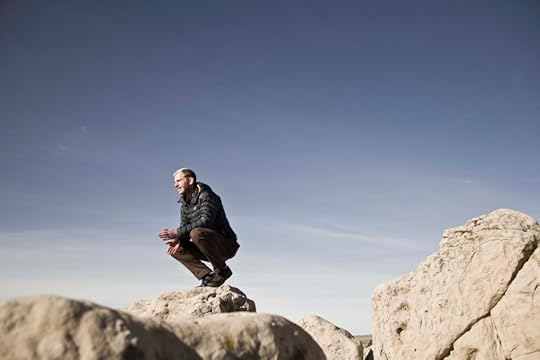
Building on yesterday’s post, and running the risk of being accused of the heresy of preaching prosperity (How dare I say God wants good things for us!), let’s look at Psalm 27:13.
I remain confident of this:
I will see the goodness of the Lord
in the land of the living.
For some reason, the phrase “in the land of the living” has always struck me as incredibly poetic. Where are we? Where have we ever been for as long as we’ve ever been conscious?
In the land of the living.
Where do we see God’s goodness?
Here, in the land of the living.
It’s not just after death, or “in the land of the dead” that we see God’s goodness, though that is certainly true too. Another Psalm — 139 — tells us the beautiful line that we cannot flee from God’s presence, even if we descend to the depths.
So God’s presence and goodness permeates both the lands of the living and the dead.
In their song “Dying in Circles,” the band Silent Planet says, “we forgot your life and became a people of death.” In an interview, the vocalist said he laments the fact that Christians have put SO much emphasis on life after death, to the neglect of life before death.
But the Bible is full of good news for our lives now…we don’t need to wait until death to experience the joy, the love, the life, and the fullness of God. Too many Christians live inside a religious frame that is pretty much bad news up until we die.
But reflect on Psalm 27. Hold onto the good news that we will see the goodness of God in the land of the living; that means now, today.
And if it feels like you’re not anywhere close to experiencing God’s goodness today, just read the next verse. Here are both, together:
I remain confident of this:
I will see the goodness of the Lord
in the land of the living.
14 Wait for the Lord;
be strong and take heart
and wait for the Lord.
Note that the writer encourages us twice to wait.
Are you confident that you will see the goodness of God in the land of the living?
e
Day 43 of 100 Days of Blog
Subscribe to my newsletter here!
The post In the land of the living: Underrated Bible verses, part 2 appeared first on ethan renoe.
September 2, 2024
What I like about Joel Osteen
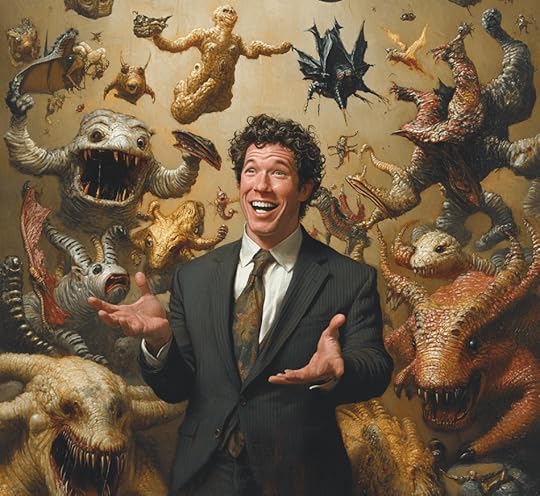
My professor a few semesters ago told us about how he was gifted Joel Osteen’s board game for Christmas. They played it and found out that you couldn’t lose it; everyone always ends up rich and successful. To me, this is a synechdoche for Osteen’s philosophy in general: It worked out that way for him, so this must be the reality for everyone.
Yes, there is the typical opinion of Osteen held by many Christians today: He ignores the cross, the reality of human suffering, the dark parts of the Bible, as well as a solid and consistent interpretation method. And yes, I hold that opinion for the most part. As a theologian, he fails miserably.
But there are two things I’ve heard from him which at least made me respect him as a human, both of which people in ministry especially could glean from.
His response to the shooting at his churchA few months ago, a female shooter attempted to open fire at Osteen’s church in Texas. She was killed in the exchange and only two other people were injured: her son and another older man. When talking about the event, Osteen prayed for the son’s recovery and I heard (but now can’t find the article) that Lakewood was paying for his medical bills.
This could have been a move to villify or disparage the son of someone who had come and tried to execute a terrorist attack on his church. Instead, he acknowledged the reality of the pain and evil perpetrated and asked God for continued mercy and protection. I thought that was a good example to his followers to choose forgiveness and seek healing instead of revenge.
People get beat up all week longThe one that really made me reexamine how I judge his preaching was this one quote I saw in an interview (Which of course I can’t find now. But he says very similar things in this article).
He said something along the lines of, “People get beat up all week long. They don’t need to come to church to get beat up more; they need to come and hear some encouragement and hope that things can get better.”
It made me see some of his theology from his perspective. Sure, it’s not the most profound, and it may not be able to pull someone up out of the trenches of suffering or addiction, but it made me respect him more. Assuming he’s telling the truth and not just trying to rob people out of their money, it’s a posture many Christians could benefit from: Wanting to build people up and give them hope. How many of us have seen pastors just use the Bible to beat people up and have them leaving the church feeling worse than when they arrived? Is that really the good news that is supposed to change our lives?
In my own communication of the teachings of the Bible, I would tend toward going a bit deeper and getting more involved in the text, and acknowledging the reality of evil and suffering more, but I really don’t think that Osteen’s is a bad starting point. In that statement (disregarding some other statements he’s made in the past), he didn’t deny the reality of evil and suffering; he simply gave Christians a motive to encourage and uplift.
And of course, positive thinking and speech is commanded in the Bible. What else would Paul mean by “rejoice always,” or, “always be prepared to give an answer for the hope you have.”
Jesus joins us in our suffering, but His goal is not to leave us there.
He didn’t die so that we would spend eternity depressed and morose.
While I don’t affirm all of Osteen’s theological takes, I can say that my opinion of him has shifted in the past year. No longer do I think he’s merely a lying thief; I think that, if we take him at his word, he wants to help people and encourage them — something many pastors could take a note from.
And lastly, I wonder how much the shooting at his own church has changed his thinking on pain, evil and suffering. It will be interesting to see if this lends any more depth to his preaching in years to come.
e
Day 42 of 100 Days of Blog
Subscribe to my newsletter here!
The post What I like about Joel Osteen appeared first on ethan renoe.
September 1, 2024
What were my goals when I was 10?
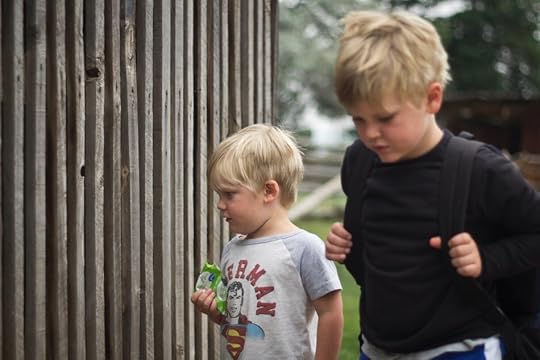
Three years into my 30’s, and I am constantly thinking about my purpose, or my life and all the things I want/need to accomplish. You ever feel like a disappointment to yourself? I should have more followers, money, and countries under my belt by now. I should have more friends.
And no matter how much I beat myself up, nothing changes.
But lately, I’ve been thinking about what my life goals were when I was ten. What made me stoked? Going to my friend Alex’s house, and the anticipation peaked when his parents took us to Blockbuster to rent one video game and one movie, then we hit the grocery store for ice cream and snacks.
It was peak living.
It’s what I looked forward to all week: the Friday sleepover.
My picture of life in a good future would have required very little. A home with some people I liked being around all the time, and enough money to buy ice cream and a pizza, plus some fun, bonding entertainment.
This was also way before the internet poisoned our minds and attention spans and made us long for larger and less-attainable things.
The one verse from the Bible that’s been spinning around my mind lately is painful because it seems to be at odds with many of the things I want for my life. 1 Thessalonians 4:11 says,
…make it your ambition to lead a quiet life: You should mind your own business and work with your hands.
No thanks.
I got obscenely educated exactly so I wouldn’t have to work with my hands. Unless that includes doing tattoos, then that’s ok.
And how am I supposed to make a living as a writer without a large enough platform? How am I supposed to fund my traveling and speaking if I’m not out there, doing it?
And what if I’m not a quiet person to begin with?
One former roommate described me as ‘insanely extroverted.’ And I’m supposed to suppress that in order to line up and live a quiet life?
I need to do more homework and looking into what exactly Paul meant when he instructed us to live quiet lives. Ten year old Ethan may have been alright with that, but now I know that there is too much world out there to just be content with frozen pizza and video games.
I’m torn between these two people, and must learn from both:
10 would be content with living simply and looking forward to simple weekends, having fun with friends. Maybe we’d go play frisbee or volleyball on Saturdays and attend church on Sunday. It’s a simple, peasant life. And I need to learn from him that I can be content even in in-between seasons, like where I am now. When we feel like we need more to be happy, we need to remind ourselves that we can be content here, now. That we can actually learn to get stoked about the little things and enjoy our friend who lives 8 houses down and a nice, quiet weekend. The only one urging us to transcend this, or making us feel bad if we enjoy a little Friday night, is ourselves.
But 33 is the one pulling that kid to the next level. The one who is chasing after the adventure we saw in the movies and video games. Because I also don’t think anyone should be content with the dopamine hits from video games as a purpose in life. I can’t help but think that God often wires us to rise above a comfortable, ‘quiet’ suburban life of working through Friday and enjoying a nice weekend. Of course that’s not a bad thing, but I have come to outgrow that as a purpose which can fuel and sustain my life.
And maybe these two people are indicative of the two impulses at work in the world everywhere. Conservatism holds onto what we have and what we have established is good, while Progressivism is always longing for what’s next, and where we can get to. It says, sure, I was born into a ‘5,’ and that’s good enough, but why not try to use my 70 years to get the world up to a ‘6.3’?
These two forces are present in me, as they are in everyone to varying degrees, and I’m always struggling to reconcile where I should be content versus where I should strive forward and hold a healthy amount of discontent which spurs me onward and upward.
What do you think?
e
Day 41 of 100 Days of Blog.
The post What were my goals when I was 10? appeared first on ethan renoe.
August 30, 2024
no buts.

If you ask a lot of Christians today what God thinks about people in the LGBT+ community, you may get a similar answer:
Yes, God loves them and they’re made in His image and they’re all welcome in church……but…
Then typically go on to talk about the precautions of what they just said. Like, Yes God loves them, but not their actions. As if that were the question. As if the answer is different for gay people vs. straight people.
If you asked someone what God thinks about Ethan, I would dread that ‘but.’
“Yes, God loves Ethan, but…”
Like, wtf?
I’ve heard that response so often (and even given it myself) that it’s no wonder those people are turned off from the church! Who wants to be loved and accepted conditionally?
“Yes, God loves you and you can worship with us as long as you suit up and behave…”
Isn’t that sort of antithetical to, like, the entire gospel we preach? That it’s not what we do that makes us acceptable to God? Of course, we always have separate conversations about our actions and beliefs. But I don’t hear the same sort of follow-up for straight people ever.
“Does God love straight people?”
“Yes, but as long as they don’t commit adultery.”
Never heard that answer once, lol.
It mainly seems like it’s people who are other from us about whom we respond in that way.
Gay people, as long as they don’t act on it.
Addicts, as long as they’re getting clean.
Muslims, as long as they come to believe in Jesus.
Same with Buddhists, Hindus, and of course, Catholics.
It’s a weird culture we’re in.
Look at Jesus. He hung out with prostitutes and sinners, but you don’t see Him jump up from the table and clarify to the Pharisees: “Hey guys, just FYI, I’m sitting with them, but I do not approve of their lifestyle. Just want you to know.” I doubt these outcasted people flocked to Jesus because he was stingy with God’s love.
“We love hanging out with Jesus because He’s always clarifying that God loves us but not our actions. He’s real clear about that, so we all love chilling with Him.”
— The Prostitutes
The moral teachings came at other times, but I doubt Jesus was always harping on that.
From now on, if someone asks us if God loves gay people, or any other type of people, let’s just say yes.
No buts.
e
Day 39 of 100 Days of Blog.
The post no buts. appeared first on ethan renoe.



